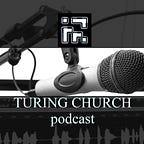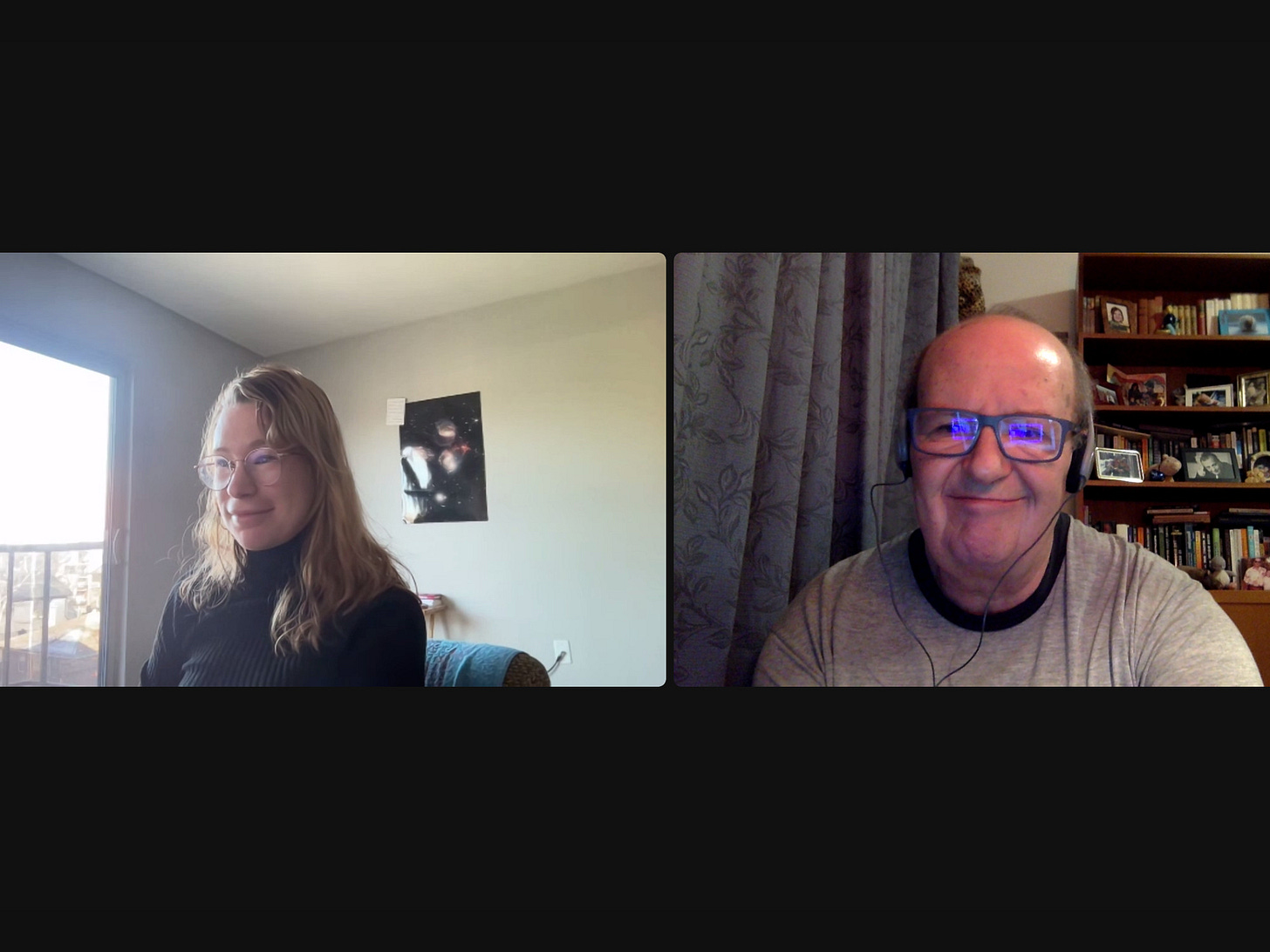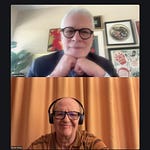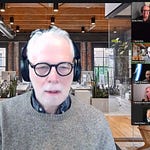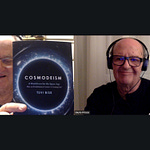This episode of the Turing Church podcast is a conversation with Emily Adlam, the author of a book titled “Foundations of Quantum Mechanics” and many insightful papers.
The video is published in this website and YouTube.
A conventional local definition of determinism is that the future is determined by the present with causal influences limited by the speed of light, which take time to propagate in space. But Emily argues that the universe doesn’t compute itself locally in space and time, place by place and instant by instant, but all at once globally and self-consistently. See my review of her work.
The idea of global determinism has been in the air for some time. Sean Carroll noted that “We could imagine a different way in which the laws of physics could be formulated - not as a computer that calculates the next moment from the present moment, but as some set of conditions that are imposed on the history of the universe as a whole.” Now Emily is putting global determinism on the map, with persuasive arguments and intuitive metaphors.
I find Emily’s approach very interesting, and a game-changer for philosophy of physics.
At the beginning of the conversation Emily summarizes her Sudoku metaphor for global determinism. Then we go over a previous email exchange, pasted below. At times the conversation deviates and diverges from the previous emails, so also listen!
Previous email exchange:
In your book you say that “the course of history is determined ‘all at once’ by external, atemporal laws of nature.” In other words, the universe is deterministic from an out-of-time perspective, but appears non-deterministic from within time (a concept also found in Christian theology). My intuition tells me that this could be somehow related to Gödel (a consistent mathematical system appears incomplete from within the system). Do you agree? If so, can you put this more precisely?
EA: With respect to Godel - I hadn't thought about it! That's an interesting idea, I will have to reflect further on it.
Are apparently random quantum outcomes (e.g. a post-decoherence “choices”) determined by global factors distributed all over space and time, including far away places and future times?
EA: They could be! (In particular, in many cases quantum outcomes do become deterministic if you add a future boundary condition - this is studied in the two state vector formalism). But I should say I don't know for sure or even necessarily believe firmly that the universe is globally deterministic, just that it could be.
What about apparently random outcomes in non-quantum but chaotic dynamical systems?
EA: These outcomes are already deterministic from the fundamental point of view - they only appear random due to our lack of information.
I find the counter-arguments of Nicolas Gisin persuasive.
EA: I do agree with Gisin's arguments, but I find this discussion a little bit academic because ultimately we don't live in a classical world, we live in a quantum one. Therefore it doesn't make much sense to me to speculate about what happens when you try to make classical physics infinitely precise - the answer is that you hit quantum mechanics when you go down to those scales.
There are suggestions that our universe appears quantum precisely because of strongly fractal chaos.
EA: I do think that's a possibility, but the origins of quantum indeterminacy are quite a different topic to the origins of indeterminacy in classical chaos so I think the two topics should be addressed separately.
In “Spooky Action at a Temporal Distance” you note that general relativity is usually interpreted as a temporally local theory. But you suggest that it should be interpreted as “an atemporal, temporally nonlocal” theory because a solution to the Einstein field equations is a full history of a spacetime. Does the breakdown of local determinism in spacetimes with naked singularities and closed timelike curves suggest that your interpretation is correct?
EA: In a way! Naked singularities and closed timelike curves are examples of spacetimes which are not globally hyperbolic, and the Einstein equations in their (temporally local) time evolution formulation can only produce spacetimes which are globally hyperbolic. That is, there are a whole set of valid solutions to the Einstein equations which can't occur at all in the time evolution formulation. So on the one hand, proponents of temporal locality might simply insist that as a matter of fact, the spacetime we are in is produced by time evolution, so it must be globally hyperbolic, so naked singularities and closed timelike curves don't occur. But on the other hand, one might worry that it's not justified to simply exclude a whole class of valid solutions like that. The question really comes down to what is the fundamental law - is it the time evolution formulation, or is it the Einstein equations in their usual form?
In “Determinism Beyond Time Evolution” you say that “we could have free will in the context of some sorts of holistic determinism… our actions are determined by other events, but also those events are partly determined by our actions...” In other words, a holistic universe without me would be a different universe, and therefore I am a partly free agent in this holistic universe. This is a subtle concept of free will. Do you find it emotionally acceptable? If so, how would you try and persuade one who doesn’t?
EA: Well, I think that in the ordinary conception of reality (where everything is either random or determined by the initial state) there's definitely no sense in which we have free will. So even if this concept of free will is a little subtle, it's better than the alternative, which is no free will at all!
In “Fundamental?” you say that the laws of nature “apply simple macroscopic constraints to the universe as a whole and work out what needs to happen on a more fine-grained level in order to satisfy these constraints.” I assume you have the laws of thermodynamics in mind as an example of macroscopic constraints. Could the macroscopic constraints include the emergence of complexity, life, consciousness, and some kind of “quality” (Robert Pirsig)?
EA: They could do! More or less anything one can imagine could be written in the form of a constraint, so the key problem is to come up with some criteria for how we should judge whether a putative constraint is really part of the objective structure of reality or whether it's just a higher-level description with no modal force of its own.
You continue: “Presumably at least some features will be left underdetermined by the global constraints…” I read this as an opening to residual non-determinism, or to multiple worlds. A “properly set up” sudoku problem has a unique solution, but a sudoku problem can be overdetermined (no solution) or underdetermined (multiple solutions). Perhaps in cosmic sudoku there’s no unique-solution boundary between overdetermination and underdetermination, and therefore the universe must be a multiverse (better many worlds than no world). Do you agree? If so, could this be related to the multiverse concepts that have been proposed?
EA: I'm more inclined to say that if there are multiple solutions then one is selected at random, rather than there being multiple worlds. This is because the existence of multiple worlds leads to some very severe epistemic problems (I wrote about this in the context of the Everett interpretation here [link]. But of course I don't know for sure, since we will presumably never have direct evidence for or against multiple worlds.
Have you seen the film Arrival or read the novella by Ted Chiang upon which it is based? There are some interesting parallels with your ideas.
EA: Yes, I definitely agree that Arrival and Story Of Your Life have ideas that parallel mine, and I often use them as examples. In fact, I met Ted Chiang this summer and discussed these topics with him!

